Dwayne Johnson is the hardest-working man in show business, whose personal brand helps fuel the globally successful Fast & Furious franchise sand also his oddly satisfying Jumanji empire.
But in 2018, the action thriller Skyscraper was his magnum opus.
And like The Rock himself, Skyscraper is a fascinating paradox.
Just like the Pearl skyscraper that the film calls home — a beautiful yet hollow structure that spirals aggressively, in defiance of all known physics, logic, or common sense — neither the building nor the movie can truly be appreciated from one angle.
So let’s break down the six different ways to watch Dwayne Johnson’s love letter to America that’s delivered with a giant duct-taped fist: Skyscraper.
WARNING: SPOILERS AHEAD for a movie that literally features every major plot point in the trailer, so even if you haven’t seen it, you’ve pretty much seen it.
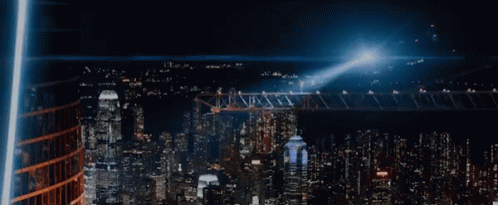
Cannonball run
Interpretation 1: As a By-the-Numbers Action Movie
Functionally speaking, Skyscraper is a Die Hard reboot.
It includes all the same plot points, in basically the same order:
European criminals infitrate a supermodern skyscraper to capture an Asian billionaire who’s hidden something they want inside a vault, so they take the guests hostage, which means a red-blooded American hero in the wrong place at the right time must push his body to the limit in order to rescue his family from certain death inside the imperilled tower while a by-the-books cop and an enraptured crowd look on from the streets below.
(Sound familiar?)
Die Hard is literally taught in film classes as a pinnacle of three-act structure, which is the step-by-step formula that most Hollywood screenplays follow.
There’s a reason this plot structure works so well: it has clear life-or-death stakes, a relatable everyman hero, and many opportunities for escalating conflicts both interpersonally (between criminals and hostages or criminals and hero) and externally (between hero and building).
So it’s no surprise that Skyscraper follows Die Hard‘s template almost beat for beat, right down to Johnson’s Will Sawyer cutting his hands on broken glass the same way Bruce Willis‘s John McClane memorably sliced up his feet.
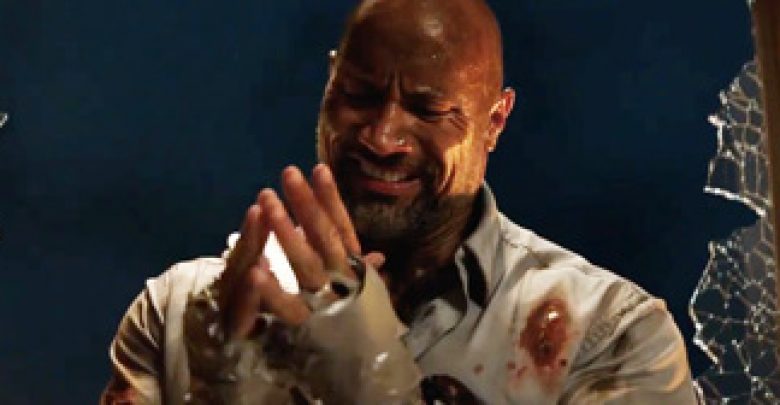
Totally sanitary
Hey, if the action movie formula ain’t broke, why fix it?
Interpretation 2: Daddy Needs a Franchise
Since the 1980s, action movies have been the best bet for making millions at the global box office. A steady stream of righteous ass-kicking is how dialect-challenged young actors like Sylvester Stallone, Arnold Schwarzenegger, and Jean-Claude Van Damme first became international icons: comedy may be cheaper to produce, but action requires no translation.
And while Marvel may currently rule the roost with their unstoppable MCU franchise, Dwayne Johnson has been the most bankable individual star of the past decade. His universal appeal is the anchor that turned a fish-out-of-water action comedy like Jumanji: Welcome to the Jungle into a surprisingly satisfying $961M global blockbuster.
RELATED POST:
In the past 10 years, Johnson has starred or co-starred in a dozen movies that have topped $100M at the box office… yet all that applause comes with an asterisk: Johnson’s biggest films tend to be built from pre-existing intellectual property (Jumanji, Rampage) or someone else’s pre-existing franchise (G.I. Joe, The Fast & the Furious).
The exceptions are Central Intelligence, where Johnson shares billing with Kevin Hart, and San Andreas, where Johnson shares billing with a once-in-a-lifetime natural disaster that you can’t exactly duplicate in a string of endless sequels.
As a businessman and an icon, Dwayne Johnson needs a role he can replicate in multiple movies, in a franchise he owns exclusively.
Enter: Skyscraper
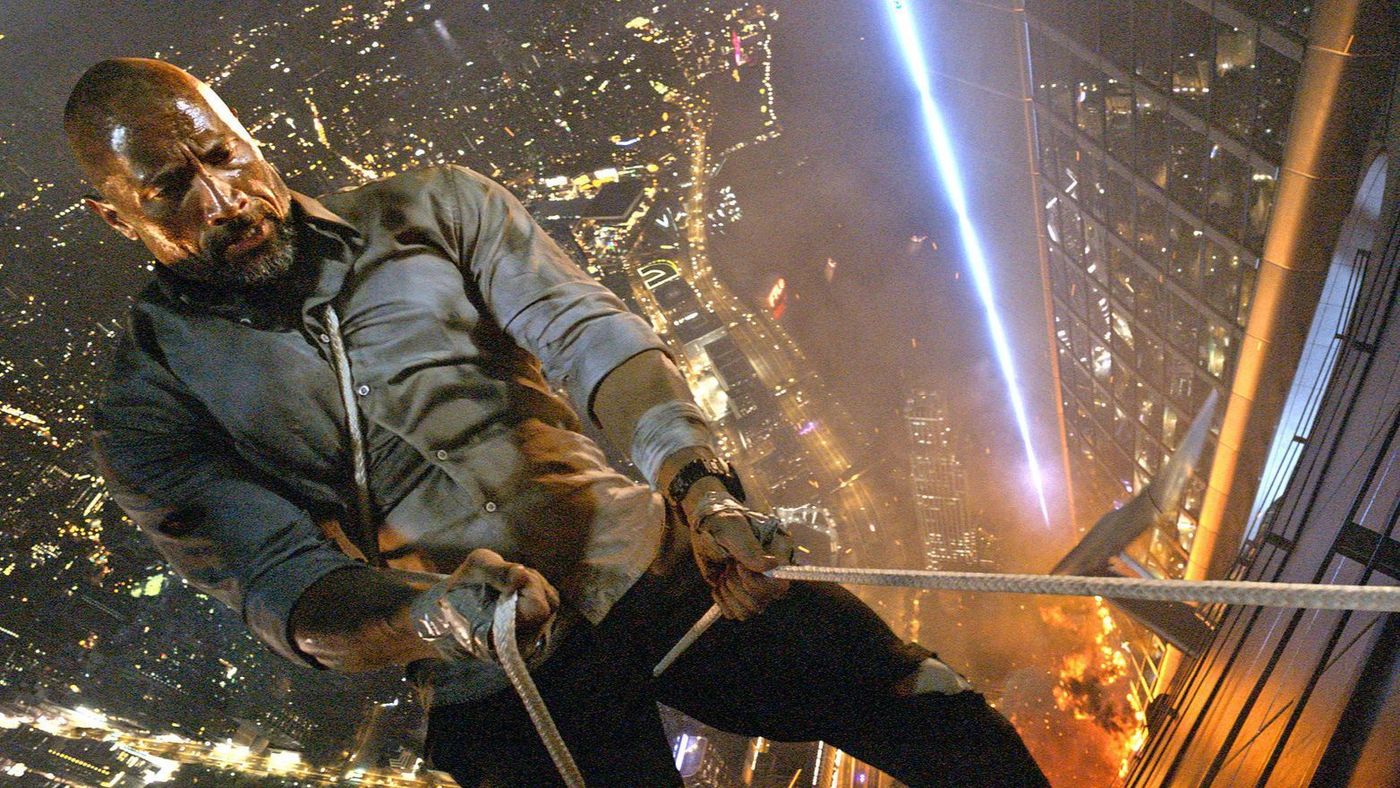
Yippee ki-yay, family-friendly PG-13 style!
The movie is a one-man show where Johnson stars in nearly every scene.
This gives us plenty of time to get acquainted with his character: ex-law enforcement agent and current security expert Will Sawyer, a man with best-in-class skills and the sheer will (see, it’s even his first name) to do whatever’s necessary, no matter what.
Now, if only Sawyer wasn’t kind of a joyless, one-note drag.
Which is ironic, considering that Skyscraper can also be seen as…
Interpretation 3: The Bottled Essence of Johnson’s Mid-Career Persona
How did we reach the era where Dwayne Johnson is the world’s biggest movie star?
Well, it all began on pay-per-view.
After first establishing his boundless charisma as megapopular wrestler The Rock on the WWE, Johnson made the rare-for-wrestling leap to become an unquestionable Hollywood success. But like most stars whose persona seems indistinguishable from their earliest breakout role (Sean Connery, Harrison Ford, George Clooney), Johnson knew he had to expand beyond the schtick that audiences had come to expect from him in order to avoid being typecast for the rest of his life.
By tinkering with his tough guy image in his more adventurous early roles (The Rundown, Be Cool, Southland Tales), he expanded his range for comedy and drama. He proved to America that he was more than just a glorified stunt double, possessing enviable comic skills, a surprising amount of pathos, and the endearing ability to laugh at himself, all while occupying a body that constantly reminds you he should be taken seriously at all times.
But that was all just market testing.
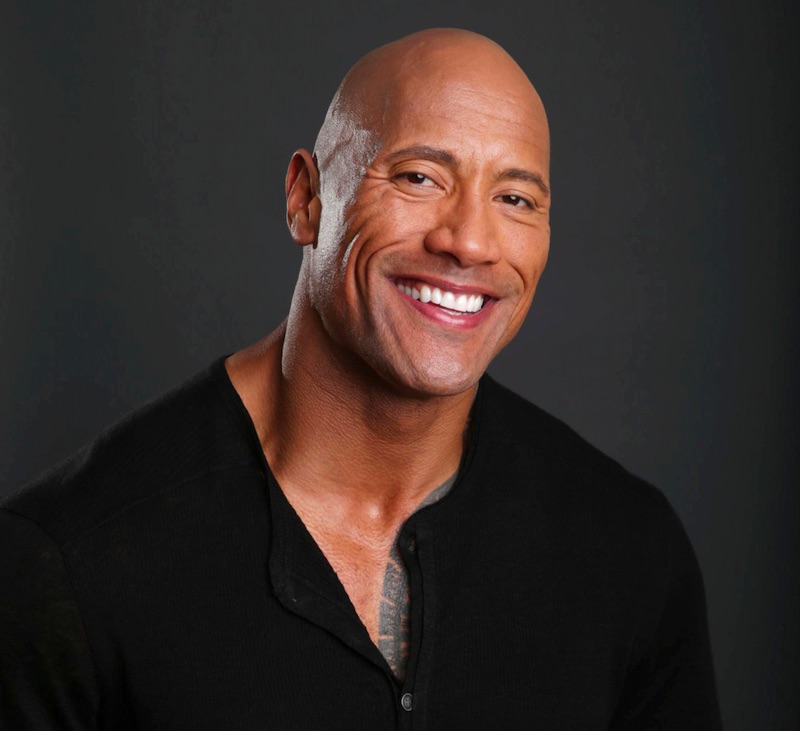
Hello, I’m America’s sweetheart
Johnson eventually found his onscreen niche in a much more predictable role, as America’s lovable hardass: the strong dad personified. This hyper-optimized image appeals to nearly every demographic: men and women, young and old, gay and straight, left and right. Its meticulously curated balance of “woke” traditionalism makes Johnson one of the most magnetic and safest box-office bets around.
But there’s one big wrinkle in Johnson’s otherwise self-sufficient persona, and Skyscraper magnifies it by what it doesn’t give us:
Humor.
Johnson is a gifted actor who can always find both the humor and the emotional tension in any scene, and his most enjoyable traits are highlighted in exchanges with others. He’s at his best when he has an onscreen companion to play off, which is one big reason why his comedies with Kevin Hart are such an easy sell.
Unfortunately, in its relentless focus on unstoppable family man Will Sawyer, Skyscraper forgot to pair him with a peer who could add levity to the situation.
Having a comedy counterpoint in small doses is a huge reason why Die Hard works so well. The absence of humor as a tension release makes Skyscraper feel almost self-satirizingly melodramatic by comparison, like a Lifetime movie with guns.
The film seems to recognize this flaw and tries to course correct, but it does so with a curveball.
While Die Hard had the good sense to give John McClane a walkie-talkie so he could banter with Sgt. Powell, Skyscraper instead steals from the Cast Away rulebook. If Tom Hanks could score an Oscar nomination by talking to a volleyball, Skyscraper bets you’ll empathize with an equally-desperate Dwayne Johnson forming a codependent emotional bond with… duct tape?
Interpretation 4: A Two-Hour Commercial for Duct Tape
Every hero needs his own instantly-recognizable avatar.
Captain America has his shield.
Indiana Jones has his whip.
Jon Snow has his hair.
And Will Sawyer has… a roll of duct tape.
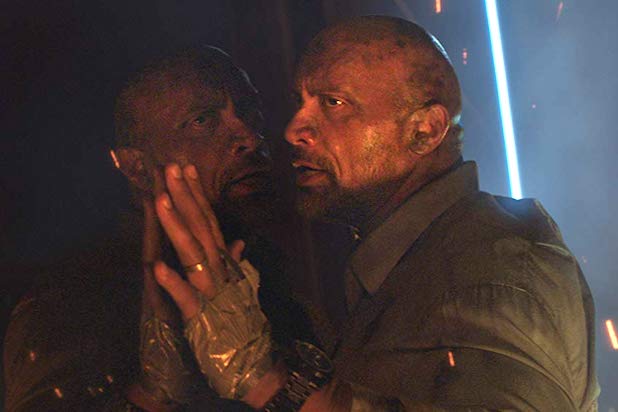
Peter Parker got swole
There’s a reason I have an image called “skyscraper-dwayne-johnson-duct-tape-4” on my hard drive right now, and it’s because there are three others next to it, all featuring Johnson in different duct tape-dependent scenes from Skyscraper.
According to this movie, there is literally nothing that duct tape cannot do.
Heal a puncture wound? Check.
Enable a 260-pound man to climb the polished glass surface of a building like the world’s heaviest Spider-Man? Check.
Play the central role in a hostage-rescuing double-cross? Checkmate.
If there is a Skyscraper 2, I absolutely expect that duct tape will also be proven to stop bullets, conduct electricity, and form a waterproof boat made entirely of itself.
Johnson even goes so far as to call the product out by name multiple times in this movie, including the moment directly after he extracts a footlong piece of shrapnel from his bare shoulder while bandaging the wound with duct tape. As he does this, he says, “If you can’t fix it with duct tape, you’re not using enough duct tape.”
What’s most impressive about this line is that he says it out loud, to no one, because the movie forgot to give him a costar. Which is a totally normal thing to do, right?
At this moment, I literally leaned over to my girlfriend and whispered, “Who was that line for?”
“Middle America,” she says.
Which brings us to…
Interpretation 5: As a Meta-Commentary on America’s Future
Skyscraper is an action movie starring a blended American family who saves an Asian businessman (and each other) from European terrorists in a Hong Kong high-rise.
It is the very definition of American cinema right now: wrapping American values in a global package intended to appeal to the widest imaginable audience.
But it’s worth unpacking exactly which values Johnson is smuggling into Skyscraper, and why.
That’s because, in addition to being a tireless performer, Johnson is also a peerlessly uncanny businessman. He understands how every message he sends on social media will be interpreted by audiences around the world, and he’s hyperconscious of never saying or doing anything that might damage his universally beloved and respected personal brand.
He’s also become the walking embodiment of what many Americans think of when they picture the word “hero” — even though many of his best-known roles are actually antiheroes.
RELATED POST:
With such a massive personal brand at stake, it also means there isn’t a single word or image in Skyscraper that Johnson didn’t personally vet himself.
So what does it all add up to?
Let’s look at the pieces.
Will Sawyer is an ex-law enforcement agent who worked in hostage negotiations. His wife Sarah (Neve Campbell) was a combat surgeon who did two tours in Afghanistan. So, appealing to traditional American military values? Check.
They meet when Will hesitates to kill a father who had taken his own family hostage, and this hesitation causes the incident that costs Will his leg, his career, and his self-confidence. But it also gains him a wife (doctor Sarah, who evidently falls in love with him post-surgery) and two photogenic kids. Simultaneously appealing to progressive American values of multiracial inclusivity and traditional family values of strong men and supportive women? Double check.
Will starts over as a solopreneur who specializes in evaluating high security systems. A nod to the gig economy and untrustable corporations? Check.
He’s betrayed by his former partner, who blames Will’s hesitation-induced trauma for his own miserable life. PTSD mixed with class envy? Check.
The movie’s industrial hero is an Asian scion named Zhao Long Ji (Shin Han), who seems to have built the inscrutable and mysterious Pearl skyscraper for the oldest reason imaginable: because he could. An homage to the American cultural traits of westward expansion, manifest destiny, and winner-take-all-capitalism, but with an “emerging markets” twist? Bingo.
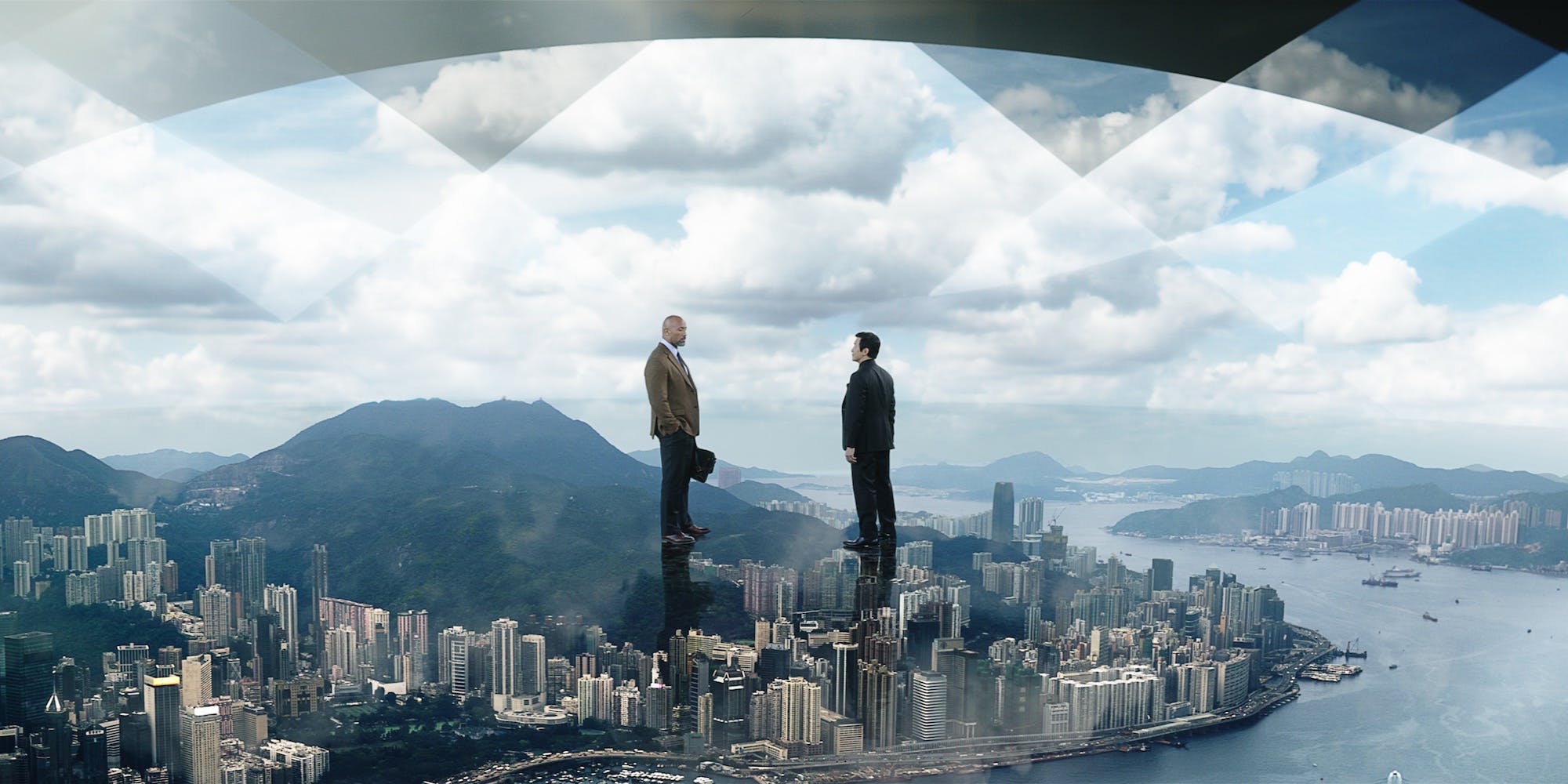
I can show you the world / shining, shimmering, splendid…
In fact, every facet of the film seems to be doing two things at once: reinforcing traditional and/or American ideals (hard work, individualism, determination, the unassailable sanctity of family) with progressive or international values (multiculturalism, gender equality, feminism, entrepreneurship).
But because Johnson is a shrewd businessman who understands that his core audience will only accept progressive ideals if they come wrapped in the safety of tradionalism, he always tempers his liberal signals or counterbalances them with “red meat” iconography.
Sure, he’ll practice greeting his Chinese client in Mandarin… but it’ll be too tough, so he’ll give up and say, “Ah, screw it, I’ll just high-five the guy,” which is a line that a) got a huge laugh in my theater, b) nods to progressive inclusivity while still asserting that the old American way is all anyone really needs anyway, and c) he said out loud to himself in the mirror because, again: lack of onscreen costars to banter with.
Which bring us to our final way to view Skyscraper:
Interpretation 6: Dwayne Johnson as the Arbiter of Truth
At one point, Johnson says the incident that cost him his leg led him to “lay my sword down, and I haven’t picked it up since.”
It’s a curious statement, because he and his former partner were literally just referring to their time spent shooting guns. But Johnson’s use of “sword” is intentionally evocative: it’s his assertion that good men have only ever wanted to live in peace for centuries, yet war always seems to find them and forces them to defend what they love from those who would destroy it.
(It’s also an unintentional reminder that his headlining role in the underrated Hercules is probably the best distillation of the Dwayne Johnson worldview yet.)
But the most Johnson-esque line in all of Skyscraper actually goes to his costar.
When Sawyer asks Zhao Long Ji what he plans to do in the aftermath of the towering inferno, he thinks for all of one second, and then he simply says one word:
“Rebuild.”
In a movie about terrorists and skyscrapers, this is the word that every American wants to hear, no matter how illogical it might be given the circumstances.
And that ultimately sums up what makes Dwayne Johnson movies tick.
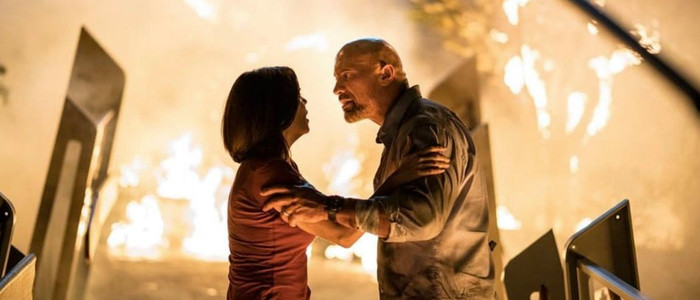
This is fine.
In his films, the good guys are never wrong, they never have to reconsider their ideals, and they never get themselves into a situation they can’t overcome.
Even their apparent mistakes, like Sawyer’s initial hesitation that costs him his leg, or the no-win situation he seems to be in at the movie’s climax, turn out to be opportunities that lead them to new successes — without his hesitation, he never would have met Sarah — or problems that are solved by paying off the hero’s own prior actions from a previous act.
In other words: a Dwayne Johnson hero is always going to be just fine.
Sure, this makes the stakes of a movie like Skyscraper seem entirely artificial. But you don’t go to see a Dwayne Johnson movie for surprises; you go to have your own self-image reassured.
Like most Americans want to see themselves, a Dwayne Johnson hero is only ever temporarily inconvenienced by the crooked schemes of others, who keep infringing on his sovereign right to make a good, honest living and enjoy a peaceful life with his family. And by staying true to himself, he always wins in the end.
So yes, Skyscraper gives audiences almost exactly what they want from Dwayne Johnson… and in return, Johnson tells us what he wants us to want: an affection for yesterday, an appreciation of today, and a boundless vision for tomorrow.
It’s part Americana, part self-help, part workout video, and part Hallmark card…
All held together with duct tape.
More Posts Like This:
8 Reasons Why Ocean’s 8 Is the Perfect Feel-Good Heist Movie
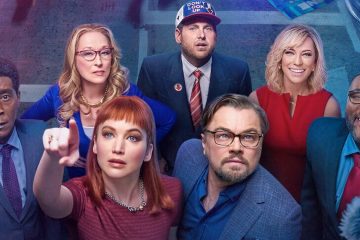

0 Comments